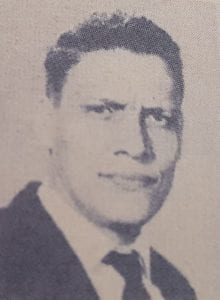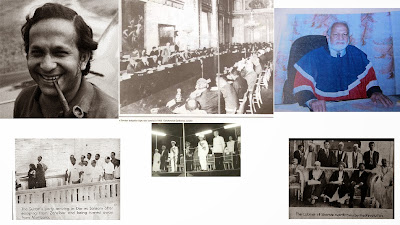
The opening of the New Parliment Building in 1954. Zanzibar Omani Sultan Sayyid Sir Khalifa bin Harub bin Thuwein Al Said with Sir Evelyn Baring.
Sir Donald Cameron became the governor of Tanganyika in 1925.[20]:page 5 "His work ... was of great significance in the development of colonial administrative policy, being associated especially with the vigorous attempt to establish a system of 'Indirect Rule' through the traditional indigenous authorities."[20]:page 5 He was a major critic of Governor Byatt's policies about indirect rule, as evidenced by his Native Administration Memorandum No. 1, Principles of Native Administration and their Application.[20]:page 6

Harry Hockaday Payet
By Julien Durup - A student of history
Harry Payet was born in 1925, in Zanzibar of Seychellois parents and died at Praslin in 1997. His second given name, “Hockaday” meaning the second Tuesday after Easter, is derived from an ecclesiastical festival styled Hokeday or Hocktide. That feast ceased to be observed after the Reformation.
It is a rare given name, presumably the first one in the Seychelles, perhaps it was because he was born on the second Tuesday after Easter.
Harry Payet served with the British armed forces in North Africa and later in the Civil Service in the Seychelles. He was the first to demand that free speech was a right for all Seychellois and also the first to form a political party that feared the colonial authorities and the big landowners in the Seychelles. He created, with F V Julienne and Guy Fontaine “Seychelles People’s Convention Party” the first Political party in Seychelles; he also formed his second party the “Seychelles Archipelago Action Group”. Later, he formed the “Seychelles Islands United Party” (SIUP) with Rifned Jumeau. As Secretary General of SIUP, Harry Payet made an eloquent speech on 28 April 1963 at Gordon Square.
In January 1958, when he applied for permission to hold a public meeting on Gordon Square, he was told that no permission was required. However, he was warned to be in conformity with the law, and the meeting was arranged for the 26th January of the same year. His first political meeting (which was in fact the first political public meeting in the Seychelles), started at 4.58 pm and finished at 6 pm, it attracted over a thousand people. Harry Payet used his articulacy gift to inflame the poor, and condemned in violent terms their .oppressors. According to the police the following influential people were the main supporters of Harry Payet: Charles Evariste Collet, R A Mullery, Captain Harvey-Brain, Alexandre Deltel, R Murray, Sir Michael Nethersole * several others and a few rich Indian merchants. The Seychelles authorities and Collet thought that Harry Payet’s speech might stir violence.




Prince Jamshed Proclamation As Sultan Of Zanzibar On July 4Th 1963.

His Majesty the Sultan of Zanzibar -1963 - H.M. Sultan Sayyid Jamshid bin Abdullah bin Khalifa II bin Harub Al Said, Sultan of Zanzibar and its dependencies, GCMG (29.12.1963). He was born at Unguja, Zanzibar, 16th September 1929, eldest son of H.H. Sayyid Abdullah bin Khalifa II bin Harub Al Said, Sultan of Zanzibar and its dependencies, KBE, CMG, — at Zanzibar.
Two African countries, Zanzibar (now part of Tanzania) and Kenya both became members of the United Nations on 16 December 1963. This year marks fifty years since the two African countries have been members. The organisation’s membership grew to 115 members that year.
Independence and Union of Tanganyika and Zanzibar[edit]
In 1954, Julius Nyerere, a school teacher who was then one of only two Tanganyikans educated to university level, organized a political party—the Tanganyika African National Union (TANU). On 9 December 1961, Tanganyika became independent, though retaining the British monarch as Queen of Tanganyika, and Nyerere became Prime Minister, under a new constitution. On 9 December 1962, a republican constitution was implemented with Mwalimu Julius Kambarage Nyerere as Tanganyika's first president.
Zanzibar received its independence from the United Kingdom on 10 December 1963, as a constitutional monarchy under its Sultan.
Zanzibar revolution and merger with Tanganyika[edit]
On 10 December 1963,[33] the Protectorate that had existed over Zanzibar since 1890 was terminated by the United Kingdom. The United Kingdom did not grant Zanzibar independence, as such, because the UK had never had sovereignty over Zanzibar. Rather, by the Zanzibar Act 1963 of the United Kingdom, the UK ended the Protectorate and made provision for full self-government in Zanzibar as an independent country within the Commonwealth. Upon the Protectorate being abolished, Zanzibar became a constitutional monarchy under the Sultan.[34]
However, just a month later, on 12 January 1964 Sultan Jamshid bin Abdullah was deposed during the Zanzibar Revolution.[35] The Sultan fled into exile, and the Sultanate was replaced by the People's Republic of Zanzibar and Pemba, a socialist government led by the Afro-Shirazi Party (ASP). Over 20,000 people were killed and refugees, especially Arabs and Indians, escaped the island as a consequence of the revolution.[36]
In April 1964, the republic merged with mainland Tanganyika. This United Republic of Tanganyika and Zanzibar was soon renamed, blending the two names, as the United Republic of Tanzania, within which Zanzibar remains a semi-autonomous region.
In 1964 Rifned Jumeau merged his political party with Albert Rene and it became the Seychelles People’s United Party (SPUP). Rifned Jumeau was elected in 1969 for the Mont Fleuri Ward for the Victoria District Council elections, before being elected in 1970 for the Victoria South Electoral District as the member of Legislative Assembly.
Mr Jumeau was among one of the founding members of the Seychelles Islanders United Party (SIUP) in 1963 which later changed to Seychelles People’s United Party (SPUP). The SIUP started in England. He was also a central committee member of SPUP from 1964 to 1974 and also served as its treasurer.
It is said that since the birth of SPUP newspaper ‘The People’ in August 1964, Mr Jumeau played an active role as editor and did his best to project his party’s policies, principles and achievements to the Seychellois public and to the outside world.
In an effort to delay the transition to black majority rule, Rhodesia's predominantly white government issued its own Unilateral Declaration of Independence (UDI) from the United Kingdom on 11 November 1965. (The government of the United Kingdom supported Rhodesia's transition to a multi-racial democracy.) The UDI administration initially sought recognition as an autonomous realm within the Commonwealth of Nations,
In 1965, the United Kingdom split the Chagos Archipelago from Mauritius and the islands of Aldabra, Farquhar and Desroches (Des Roches) from the Seychelles to form the British Indian Ocean Territory. The purpose was to allow the construction of military facilities for the mutual benefit of the United Kingdom and the United States. The islands were formally established as an overseas territory of the United Kingdom on 8 November 1965.[15]
We have been spending some time thinking of Mr Rufned Jumeau, given we had posted his obituary above that of Mrs Nazareth from Zanzibar, the Family, reading the linking issues/topics of Mr Rufned Jumeau and Mr Harry Hockady Payet, to discover he was born in Zanzibar - before Judge EJ Stiven arrive in Seychelles as an exile the Zanzibar Revolution I used to spend time at my Uncle Levy Ah Wan cobbler shop and Mr Desire Ah Time, the Police Station across and ~Archbishop Makarios and the old Adventist Church , the office of Union Lighter age and Maitre Loiseau office next door , among others Mr Adam they used to spend hours debating and discussing politic, the impression they left on my person and Mr Finley Roselie. Later after Judge EJ Stiven had arrived in Seychelles by then I had been to East Africa studied at the Company school and the Catholic College, had made the acquaintance of Mr Albert Rene, Mr Loiseau and Mr Guy Sion and others in Uganda. The Faure Family -the political issues which occurred in Seychelles and Judge Stiven was responsible for some of the Justice/Court issues. Nobody had ever said that he was born in Zanzibar - what a discovery and very important - had Lady Thatcher and his government known this, the Masonic /'Establishment and the White House of President Bush and later the Mitterrand. That SIROP program important role in changing Zanzibar and to some degree Tanzania - Lord Oxford never hinted or mentioned that Mr Harry Payet had been born in Zanzibar or the last Sultan or the Nazareth Family and other Zanzibari we have known over the years. For that matter neither Sir James Mancham and all his politicians and those form SPUP we had known . Certainly nobody from President Nyerere or those in Zanzibar at the time of writing that SIROP program, nobody from his highness the Agha Khan community - this discovery will make President Saddam Hussein very mad from his resting place . those who had judge we had no rights to involve the Arab/Muslim in our Indian ocean then situation/.issues that SIROP program and our community in exile in Britain then.
We have not had a chance to research Seychelles Archive, that National Assembly LDS and the Truth Commission and Reconciliation, all those like Mr Paul chow and others, new generation of politicians Hon Wavel Wankalawan and his Party who refused, are of the view the regional and international events of the Cold War do not matter as to what took place in Seychelles and how those experts or so call experts which want to explain events. We hold a different view - the need to study events and development of then Cold War in the Region what triggered some of those important decision, actions and yet what the British have written, the American and others as History and facts. Even the International Court of Justice the most important of UN Justice Organ.
The Mr Harry Hockady Payet we remembered his politic was of Liberal radical, He must have flowed events in his native country and East Africa then Seychelles colonial media Gazette.
He must have know the role Judge E J Stiven played leading up to Zanzibar Independence, either he kept it to himself or share it with the SPUP . Those who knew studied the situation then vast more issues than we have addressed here fairly certain there would be a coup d'etat in Seychelles, those who would be killed and their property confiscated and yet. Those from Sir James Mancham camp, those who had know that Mr Harry Hockady Payed was a Zanzibari, certainly with good contacts and knowledge of what was going on, eventually the British Administration, the Police, the US Intelligence than the CIA and MI5 .
His Joining the DP and much later representing the SNP on Praslin after the return of Multiparty, yet no mention of that SIROP program and all those from 'Zanzibar who had helped and impute in that SIROP program. . The Sultan Family, others from the Gulf Region and other Colonial officials. Person like Chief Justice Wolfgang Durado. The person of President Julius Nyerere then OAU 1986/87 -In July 1987, Nyerere returned to the University of Edinburgh to attend a conference on "The Making of Constitutions and the Development of National Identity", where he gave the opening address on post-independence Africa.[244]
Wolfgang Dourado was a former attorney general, and later Chief Justice, of Zanzibar.[1][2] After the 1964 Zanzibar Revolution, Dourado chose to remain behind ...















